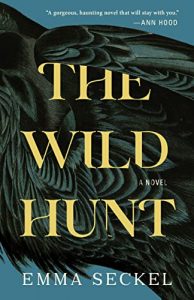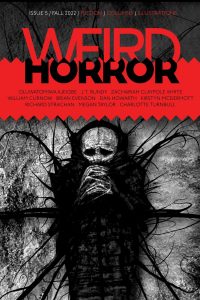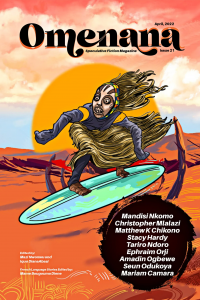Colleen Mondor Reviews The Wild Hunt by Emma Seckel
 The Wild Hunt, Emma Seckel (Tin House 978-1-953534-22-4, $16.95, 360pp, tp) August 2022.
The Wild Hunt, Emma Seckel (Tin House 978-1-953534-22-4, $16.95, 360pp, tp) August 2022.
Set in one of the lesser populated of the Shetland Islands, The Wild Hunt is a historical novel steeped in supernatural stories and the lingering horrors of war. It can be read both as a tightly woven drama about a community’s struggle to cope with cumulative grief, and also as a darkly appealing look at the overwhelming power of folklore. Quiet, powerful, and gorgeously executed, author Emma Seckel has crafted a compelling title that occurs in another time, but is more fitting than most for the troubled world we are living in today.
A few years after the end of WWII, Leigh Welles is called home from the Scottish mainland by her father’s sudden death. Although it is tragedy that brings her back, Leigh welcomes the chance to flee a life that has steadily fallen apart. She set off for the mainland after the war as a young woman intent on finding success, but the reality was constant struggle and loneliness. On the island are the people Leigh grew up with and her family’s small hardscrabble farm. With her father dead and her mother long gone, there is now only Leigh and her brother, a mainland lawyer who has become distant and cold since the war. The island offers Leigh the memory of peace and safety, and she is desperate to have both in her life again. Stepping through the door of her childhood home, she knows right away she never should have left.
The problem is that things on the island have changed dramatically in the past few years. Although it remained insulated from enemy attack, nearly every family suffered grievous losses, and the list of the dead remains devastating. Seckel mentions these fallen men and women as Leigh interacts with their families, one lost in the Royal Air Force, another the navy, another parachuting behind enemy lines in France, and on and on. Some returned only to fade away following the war, others left Shetland behind forever, hoping to find the nightmares silenced in a new country, with no memories. The island is battered in more ways than one now, swimming in a grief that shows little sign of letting up.
In the midst of this ongoing sorrow, Leigh notices an unexpected threat in the annual fall return of the crows, believed by the islanders to be the ‘‘sluagh’’ of Scottish folklore. These ‘‘hosts of the dead’’ have amassed in unprecedented numbers and are becoming increasingly aggressive, even murderous. Everyone’s resignation to the attacks, and the possibility of having to leave their island home because of them, make no sense to Leigh. She becomes determined to shake the community out of its malaise when a young friend goes missing and the sluagh are blamed. Teaming up with another recently returned islander, who labors under the weight of losses from his service in the Royal Air Force, Leigh sets out to find her friend. His return, however, only raises more questions about the sluagh, and prompts Leigh into a confrontation that lays bare just how great the price of war has been for those she holds near and dear.
The Wild Hunt is an extraordinary novel that digs deep into the trauma of war, from those who fought it to the many people who labored back home, supporting and coping as best they could. Seckel writes beautiful sentences, bringing readers into the islanders’ pain as Leigh tries to unmask the source of the sluagh’s unprecedented behavior. Here the author describes life during the war for Shetlanders:
During those six years they had all gotten used to the helpless feeling of it, being stranded on this little spit of rock way out in the middle of the North Sea, tragedy raining down all around them, and they with no ability to stop it. All Leigh’s wartime initiatives – the knitting, the metal collecting, the condolence calls – had been an effort to stave off that helplessness, the surety that an inevitable dread future was marching towards them double-quick.
Then the war ended, but the helplessness didn’t end with it.
Ultimately, the islanders must choose to acknowledge their grief, feel their pain, and face each other with all of their loss. They must come together, and with Leigh as the catalyst, Leigh, who has felt such guilt because she feels she did not suffer enough, they will learn to truly live again. As for the sluagh, Seckel explains their presence in a manner that fits well with existing folklore while giving readers so much more to think about that they will surely linger over each page of this stunning literary experience.
Colleen Mondor, Contributing Editor, is a writer, historian, and reviewer who co-owns an aircraft leasing company with her husband. She is the author of “The Map of My Dead Pilots: The Dangerous Game of Flying in Alaska” and reviews regularly for the ALA’s Booklist. Currently at work on a book about the 1932 Mt. McKinley Cosmic Ray Expedition, she and her family reside in the Pacific Northwest and Alaska. More info can be found on her website: www.colleenmondor.com.
This review and more like it in the Sepetmber 2022 issue of Locus.
 While you are here, please take a moment to support Locus with a one-time or recurring donation. We rely on reader donations to keep the magazine and site going, and would like to keep the site paywall free, but WE NEED YOUR FINANCIAL SUPPORT to continue quality coverage of the science fiction and fantasy field.
While you are here, please take a moment to support Locus with a one-time or recurring donation. We rely on reader donations to keep the magazine and site going, and would like to keep the site paywall free, but WE NEED YOUR FINANCIAL SUPPORT to continue quality coverage of the science fiction and fantasy field.
©Locus Magazine. Copyrighted material may not be republished without permission of LSFF.






